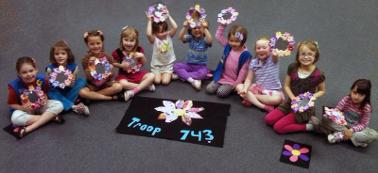Age levels of Girl Scouting
Daisies: Kindergarten and First grade. Daisy girl scouts work together to earn the petals of the "daisy" to go on their uniform smock/vest. Each petal represents a portion of the girl scout law. Daisy Scouts can also pick from several journeys to work on to help girls learn about taking action in their community.
Brownies: Second and Third grade. Brownie scouts have a varietyof try-it activities to work on, which earn them various patches. The try-it activities include things like first aid, cooking, camping skills, girl scout history and traditions, art activities and much more. Brownie girl scouts learn to start being more independent and taking more responsibility at their meetings. Depending on the leaders, girls may even start going on overnights either at local venues, such as baseball stadiums, the zoo, or the science center, or at a Girl Scout campground.
Juniors: Fourth and Fifth grade. In Junior scouts, girls often start working in patrols, which are small groups, to plan activities. This gives the girls more involvement in making decisions about the types of activities the girls would like to do, and helps them learn how to plan activities ranging from badge activities to camping trips. Troop camping teaches the girls teamwork and indepenence, along with practical skills in cooking, cleaning, and taking responsibility for one's own things. Junior scouts can develop projects to earn the Girl Scout Bronze Award.
Cadettes: Sixth, Seventh and Eighth grades. Cadette scouts really begin to step forward into leadership roles; often helping younger troops with activities and coming to provide educational experiences for younger scouts. Cadette scouts may go through program aid training, which helps provide them with skills in working with younger scouts. They are also more active in planning and leading troop activities. Cadette scouts can work together to earn the Girl Scout Silver Award.
Seniors: Ninth and Tenth grades. Senior scouts are active leaders in their community. They often help plan and run service unit activities, like World Thinking Day, Camporee's, and local service projects. Senior scouts can work together to earn the Girl Scout Gold Award, which is the highest award in girl scouting.
Ambassadors: Eleventh and Twelfth grades. This is the highest level of scouting a girl can participate in. At this age level, girls continue to use their leadership skills to plan activities and serve their community. Camping, volunteering, teaching younger girls, and more is all part of the scouting experience.
